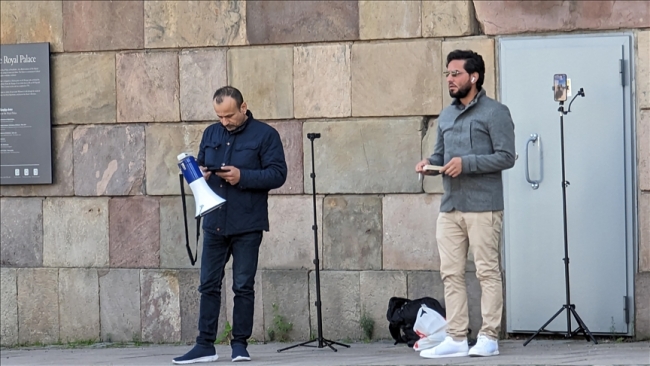In Sweden, Quran is again targeted in an act of desecration
Salwan Momika burns a copy of the Islam's holy book in front of the parliament building in Stockholm, less than two months after he initially desecrated the Quran on the first day of Eid al Adha.
Salwan Momika, a Christian Iraqi refugee based in Sweden, has targeted the Quran in the Swedish capital Stockholm in yet another desecration of the Muslim holy book.
Monday's attack on the Quran by Momika, who was assisted by Salwan Najem of Iraqi origin, took place in front of the parliament building in Stockholm.
Momika chanted anti-Muslim slogans before stepping on the Quran and eventually burning a copy of it.
Momika and Najem, however, faced the reaction of a group of Swedish activists, who asked them to stop the provocative act.
The police, protecting the attackers, arrested one of the activists, who moved to thwart the attack.
Earlier, Momika burned the Quran under the protection of the police in front of the Stockholm Mosque on June 28, which was the first day of Eid al Adha, a Muslim holiday.
A month later, he staged a similar protest outside the Iraqi embassy, stomping on the Quran but leaving before burning it. Both incidents led to widespread outrage and condemnation.
Recent months have seen repeated acts of Quran burning and desecration by racist and Islamophobic figures or groups, especially in northern European and Nordic countries.
Sweden has seen its diplomatic relations with several nations strained over previous protests involving Quran desecrations, with Swedish police granting permits for "protests" in which the organisers plan to burn the holy book.
Türkiye has repeatedly called for preventing the acts that target Islam under the "guise of freedom of expression," calling on states that allow and fall short of preventing the "heinous acts" to change their anti-Islam attitudes.
The Organisation of Islamic Cooperation (OIC) as well denounced the acts of aggression, expressing concern over the continued issuance by authorities in certain countries allowing such action to occur, and their failure to take the necessary measures to prevent the acts.
The European Union, which Sweden is a member of, has also condemned the aggression against the sanctity of the Quran.
"The EU reiterates its strong and determined rejection of any form of incitement to religious hatred and intolerance," Josep Borrell, the bloc's foreign policy chief, said in a statement in late July.
The United Nations General Assembly last month adopted a resolution deploring violence against holy books by consensus.
It denounced ''all acts of violence against persons on the basis of their religion or belief, as well as any such acts directed against their religious symbols, holy books, homes, businesses, properties, schools, cultural centres or places of worship, as well as all attacks on and in religious places, sites and shrines in violation of international law.".


